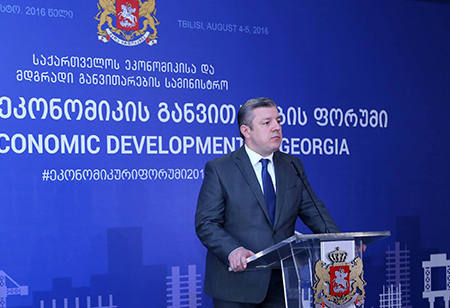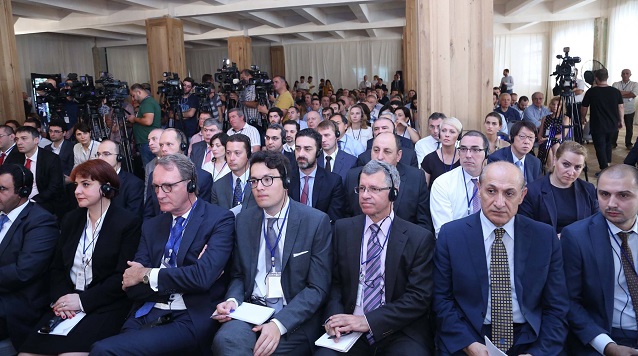PM: “We’ll kill two birds with one stone”
Gov’t outlines plans at Economic Development Forum

Georgia’s capital Tbilisi is hosting the Economic Development Forum of Georgia – an event that aims to deepen the partnership between the state and the private sector for Georgia’s further economic development.
The two-day forum brings together people from all over the country as well as invited international guests including world renowned economists Dani Rodrik from Harvard University and Charles Sabel from Columbia University to present their visions and ideas of the country’s development of economic policies.
At the event Georgia’s Prime Minister Giorgi Kvirikashvili assured participants that Georgia was a country with an open economic system. He remembered back to when Georgian Dream won the last elections and recalled the idea of how the Government’s four-point reform agenda was born.
"Four years ago, when I took the position of Minister of Economy and Sustainable Development, I had outlined universally recognised theories as a blueprint for ensuring rapid economic development of the country,” said Kvirikashvili.
"I asked my old friend Nugzar Kakhuchashvili, who graduated from Harvard University, to join our team and create a new direction of industrial development. We were interested in Rodrik’s development theory, which as a result of correct assistance, certain directions become increasingly important and unutilised capacities are fully used, therefore the whole chain of values becomes operative. Nugzar’s team studied several directions and we elaborated serious plans for action and successfully implemented several projects,” he noted.

The two-day forum brings together people from all over the country as well as invited international guests. Photo by the PM's press office.
This way the Georgian Government developed the four-point reform plan, which includes new tax benefits, infrastructure plans, governance reforms and an overhaul of the education system. This was the Georgian Prime Minister’s plan to increase economic development in the country.
"First of all, this includes systemic reforms in the education system. It will ensure alignment of the education system with demands of the labour market to avoid students spending four years studying professions that may not be in demand in Georgia,” he said.
The second most important direction is economic reforms. We decided that mobilisation of our investment resources would be crucial for Georgia and suggested abolishment of corporate income tax,” he added.
Thanks to the Government’s efforts, corporate income tax will be abolished in Georgia starting from January 2017 following the Estonian model that envisages exemption of reinvested profit from taxation and taxing only distributed income.
We’ll kill two birds with one stone by increasing mobilisation of internal investment resources and promotion of Georgia as an economically liberal state in the international arena,’ Kvirikashvili noted.
Georgia’s Prime Minister also outlined the importance of amending the capital market and reforming the pension system, which will be based on mandatory payments. These reforms will begin to be implemented next year.
He also elaborated on the state model that is concentrated on provision of services and emphasised the importance of creating a unified front-office.
"At the same time we are creating a digital space that ensures provision of services to all interested legal entities following the e-governance model. By the end of the year and at the beginning of next year we will start its implementation,” said the PM.
An important direction of the third bloc of governance reform covers the component of involvement, which implies that the business community as well as the NGO sector is engaged in the decision-making processes,” Kvirikashvili said.
"The fourth direction that we’ll concentrate on is the spatial arrangement and rapid infrastructural modernisation of the country, and this is also important. We suggested putting more emphasis on engagement of the private sector in the implementation of infrastructural projects, by achieving the correct balance between stakeholders, the quality of infrastructural projects will be improved while the burden on sovereign balance of the country will be decreased,” the PM concluded.
 Tweet
Tweet  Share
Share